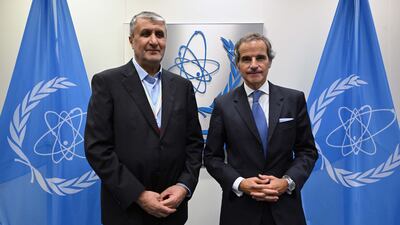Iran says it has taken a “step forward” in talks with UN inspectors in an impasse over its secretive nuclear sites.
Rafael Grossi, the head of the International Atomic Energy Agency, plans to visit Tehran “soon” amid hopes of a thaw with Iran's new President Masoud Pezeshkian. The agency is seeking “credible assurances” that Iran's nuclear intentions are peaceful.
Iran's nuclear chief Mohammad Eslami said he had a “positive conversation” with Mr Grossi on the sidelines of the IAEA's annual conference, but warned that Iran would not submit to “psychological pressure and blackmailing”.
Mr Eslami “believes that the meeting was a step forward”, Iranian state media said. Addressing delegates at the conference in Vienna, Mr Grossi said his dealings with the new government in Tehran have been “constructive and open”.
Safeguards issues
Iran's new president, who took office after the death of his predecessor Ebrahim Raisi in a helicopter crash, has appointed former nuclear negotiator Mohammad Javad Zarif as his Vice President for Strategic Affairs in a possible indication that Tehran is willing to do a deal.
However, Mr Grossi said “significant safeguards issues remain outstanding” as the agency seeks answers on three undeclared sites in Iran where nuclear traces have been found. He said it was “critical that the agency is able to provide credible assurances that Iran’s nuclear programme is exclusively peaceful”.

In a March 2023 visit, Mr Grossi extracted a statement from Iran in which it “expressed its readiness” to address the outstanding issues. However, he told the IAEA's board of governors last week that there has been “no progress” in implementing that statement.
Tehran has also angered the IAEA by denying entry to some of its inspectors. The agency says it is guessing in some areas as to Iran's nuclear activities but that its stockpile of 60 per cent enriched uranium continues to increase.
A level of 90 per cent enrichment is considered weapons-grade. Mr Grossi has said he will “not sign on any report saying that Iran has a number of centrifuges, or parts for centrifuges, if I cannot see [them]".
Iran denies any plans to develop atomic weapons, maintaining that its only intention is to generate nuclear power for civilian use. Mr Eslami said Iran's nuclear programme was the victim of “negative propaganda” which he blamed on Israel.
Citing climate change, Mr Eslami said it was “essential to transfer modern technology and equipment without discrimination”. He said “the use of clean energy, in particular nuclear energy, as a reliable baseload power source plays a significant role”.


